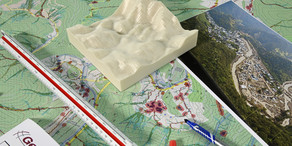Focus of research and teaching
Land policy, land management, and municipal surveying
Land is a scarce resource. Scarcity is not only an environmental condition, but also a result of political processes. Land policy describes the process of providing land of a certain quality, equipped with certain use and disposal rights. Whether scarcity is good or bad depends on the political objective. Dealing with land as a scarce resource is one of the core tasks of spatial planning. Spatial planning reinforces and alleviates scarcity as it interferes with the allocation and distribution of land use rights. Land management implements such allocations and distributions. Land management is thus the operative part of land policy. Land management is dependent on municipal land surveying, composed of cartography, geoinformation, land appraisal, and land consolidation. There is thus a clear hierarchy of land policy, land management and municipal surveying.
From instruments to strategies of land policy
In the interplay of these three, land policy needs to pursue effectiveness, efficiency, democratic legitimacy, and justice at the same time. It therefore makes use of instruments of land policy. Such instruments stand in the fraught relationship between public policy and private property rights. Thereby, instruments have an administrative-technical and socio-political dimension. The administrative-technical dimension relates to the mechanism of how an instrument functions in terms of effectiveness and efficiency. The socio-political dimension includes fair distribution as well as the specific legitimation of an intervention.
Planners may not always be able to choose freely between such instruments of land policy, but they still have a certain amount of leeway and discretion as to how such instruments are activated. A delibrate use of certain instruments can be understood as a strategy. Such strategies always have a normative connotation. Land policy can therefore - according to the above classification - be defined as a strategic component of land management.
Two areas of expertise
Contemporary challenges of planning practice - housing, land thrift, densification, but also climate change - require require an intensive examination of innovative approaches to land policy and land manament. Therefore, it is the central research focus of the chairgroup to explore and better understand strategies of land policy to deal with scarce spatial resources. Especially two areas of expertise are higly relevant for the chairgroup:
- Instruments and strategies of land policies for dealing with land scarcity, especially in the area of tension between housing shortages and reducing land updtake ("land thrift")
- Land policy for changing environmental conditions due to climate change, especially using the example of flood risk management
Research and teaching at the chairgroup are foremost dedicated to these focal areas.









